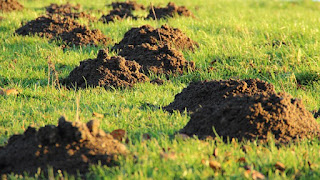Beetles, Beetles and more Beetles! by Joe Magazzi
 |
| Japanese beetle from Joe's house |
It is that time of the year again - July 4th barbecues, extensive heat and yes - the first sightings of beetles!
The beetles you see now that are busy decimating your plants are in
their last adult life cycle stage. These beetles are the adult form of white grubs (the larvae). Once these adults decimate your landscape and crops,
the beetles will lay their eggs in the later summer/early fall to start the
next life cycle. The eggs will develop into
young grubs as the summer winds down, and those larval beetles will then turn
their attention to the next headache for you…eating your turf grass and
plant roots. With multiple ways of causing problems, beetles
and their grubs will provide you with an entire season of angst! Have no fear, however, Green Earth
Ag & Turf has many organic methods to control these pests and help you
spend more time enjoying the summer instead of fighting insects.
 Like clockwork, the Japanese Beetles showed up in New
England on July 1st. We spotted our first a day late on July 2nd (must have
been a bad layover on their flight). If
they have not been spotted yet in your area, expect to see them in the very near
future. There are, however, more than
just Japanese Beetles to worry about this time of the year. There is an extensive list of beetles that
can damage plants, including Asiatic, Oriental and European Chafer Beetles. These pests do not only cause aesthetic damage but can have a huge
economic impact. For example, the Japanese
Beetle alone is estimated to cost the turf and ornamental industries $450
million per year to manage (Potter DA, Held DW. 2002. Biology and management of
Japanese. Annual Review of Entomology 47: 175-205). Some of the Japanese beetles' favorite plants are roses and
grapes, and they can decimate a soybean crop and cause heartache for farmers.
Like clockwork, the Japanese Beetles showed up in New
England on July 1st. We spotted our first a day late on July 2nd (must have
been a bad layover on their flight). If
they have not been spotted yet in your area, expect to see them in the very near
future. There are, however, more than
just Japanese Beetles to worry about this time of the year. There is an extensive list of beetles that
can damage plants, including Asiatic, Oriental and European Chafer Beetles. These pests do not only cause aesthetic damage but can have a huge
economic impact. For example, the Japanese
Beetle alone is estimated to cost the turf and ornamental industries $450
million per year to manage (Potter DA, Held DW. 2002. Biology and management of
Japanese. Annual Review of Entomology 47: 175-205). Some of the Japanese beetles' favorite plants are roses and
grapes, and they can decimate a soybean crop and cause heartache for farmers. |
| Asiatic Garden Beetle from bugguide.net |
Not to be outdone is the Asiatic Garden Beetle. Because this beetle feeds at night, the
damage that is seen on plants is often blamed on the more prevalent Japanese Beetles. The Asiatic Beetles can cause a tremendous amount of damage and they
are much more difficult to physically control (by squashing) -unless you are a
night-owl with a miner’s hat. Favored
hosts include butterfly bush, rose, dahlia, aster and chrysanthemum, according
to the UMASS Extension. Purdue
University states that this pest will be seen from mid-July to mid-August, but
may be found anytime from late June through October.
 |
| Leaf damage - Asiatic Beetle |
To spot and differentiate
the damage from Japanese Beetles, adult Asiatic Garden Beetles do not skeletonize
leaves, but rather strip, shred and notch the foliage. Oriental Beetles don’t feed much as adults, but they will
become a topic of discussion when we address the grubs in the next few weeks –
as they particularly enjoy the roots of turf grasses, perennials and nursery
stocks…plants which we value greatly in our landscapes. This also holds true for European Chafers,
which have already been out for some time in the form of June Bugs.
 |
| Japanese beetle damage - maine.gov |
Most of the damage done by beetles is a group effort - once a single beetle starts to damage a leaf, scents are emitted from
the plant that then attract more of their friends. For this reason, we recommend scented
oils as very effective organic controls for these pests. The oils not only directly interfere with the
octopamine neuroreceptors (a key neurotransmitter in many insects that
regulates movement, heart rate, behavior, and metabolism) but it may mask
scents that attract group feeding and attraction of other pests.
We have found great success with Ecotrol Plus, a mixture
of rosemary, peppermint and geraniol oils. Besides smelling great, a spray of EcoTrol every week for a few weeks
will go a long way to stopping the feeding cycle and saving your plants. Unlike
pre-emergent oils, the concentrations of these oils are very low and safe to
use all summer in the heat and bright sunlight. We
also suggest the biological control GRANDEVO , which is an advanced,
cross-spectrum insecticide that offers protection against chewing and sucking
insects. Its complex actions on pests — oral toxicity, reduced reproduction and
repellency, provides up to 14 days of residual control. GRANDEVO is also OMRI
listed; both EcoTrol and GRANDEVO are approved for ornamental and food crops.
As always, Green Earth Ag and Turf, your R & D Department, has your organic pest, disease and weed controls ready to go! Enjoy
more, and worry less this summer! Give us a call at 866-374-5101.




Comments